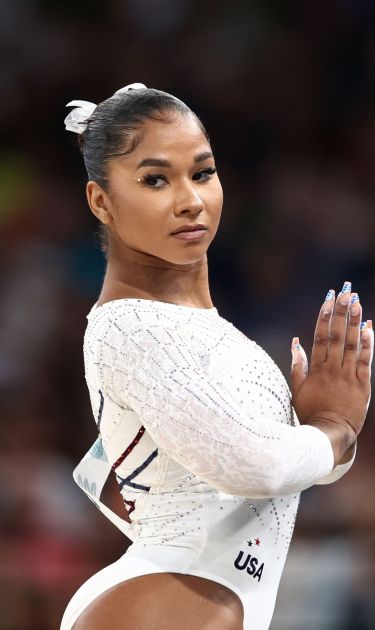One day, Jordan Chiles was on top of the world. She and the US Women’s Gymnastics team had won a gold medal in the Teams event and she had won a bronze medal in the floor event. Days later, she left social media to protect her mental health amid a barrage of racial abuse belittling her skills, in addition to the controversy surrounding her bronze medal.
What happened? The facts are these: Chiles originally placed fifth in the floor event. However, after an inquiry over her difficulty score was accepted, she moved to third place and received the bronze medal at the 2024 Paris Olympics. Days later, she was stripped of the bronze medal after an appeal by the Romanian Federation over the timing of the inquiry was accepted by the CAS (Court of Arbitration for Sport). The specifics of why CAS ruled against Chiles and what exactly went on during the hearing remain unclear, with reports indicating CAS did not notify the right US officials or provide them with enough time to mount a proper defense.
For now, what is known is this: Chiles has been moved down to fifth in the ranking, and Romanian gymnast Ana Bărbosu has been awarded the bronze medal, with a medal ceremony expected on Friday, August 16.
In the history of the Olympics, athletes who have been stripped of medals before have had their medals usually taken away because of doping or some type of cheating. Chiles did neither. At one point in this entire mess, both federations offered to share the bronze. The International Olympic Committee and the International Gymnastics Federation refused. To them, all that matters is the final results. Or, all that matters is the final results now. Because if we look at decisions made in the past in similar situations, the result is different. But the athletes who faced those situations weren’t Black and Latina like Chiles is. And that is why this decision is giving racism.

Those who follow gymnastics remember Team USA’s Paul Hamm, and how CAS established that, unless there is corruption, there must be finality in sports events. Hamm won the men’s all-around gymnastics title at the 2004 Olympics in Athens but had to wait weeks to learn if he could keep his medal. South Korean bronze medalist Yang Tae-Young was incorrectly given a lower start value on his routine in the parallel bars, an error that accounted for the difference between bronze and gold. Back then, the result wasn’t changed, with CAS quoted as saying: “An error identified with the benefit of hindsight, whether admitted or not, cannot be a ground for reversing a result of a competition.”
That isn’t the only example.
A couple of years ago, in the women’s ski cross at the 2022 Winter Olympics, the IOC decided the bronze medal should be shared between Switzerland’s Fanny Smith and Germany’s Daniela Maier. Smith had originally crossed the finish line third but was demoted to fourth after it was decided she’d impeded Maier.

You have to go far back, to the 1912 Olympics to find someone who had their medals stripped for something that didn’t involve doping or outright “cheating” in Native American athlete Jim Thorpe. Thorpe placed first in the pentathlon and decathlon but had his medals taken away by the IOC because he played two seasons of semi-pro baseball, a violation of the rules of amateurism. Thorpe’s medals, however, were restored in 1982.
These aren’t the only examples, they just exemplify the fact that if the institutions in charge wanted to give both Chiles and Bărbosu a medal, they could have easily done so. If they wanted to respect the decision made on the day, they could have gone that route too. And if they wanted to restore Chiles’ medal now, they could do so.
But, no. In Jordan Chiles’ case, the institution that has prided itself on the ideals of “Olympic spirit” instead chose to strip a young gymnast, who had done nothing but go out and compete in good faith, of a medal. And, not just that, they chose to do that and then turn their backs on what this decision meant for Chiles personally.

This is why we must examine the examples above and confront the question of why they made this decision. It’s not only that they ignored the racial abuse on social media that Chiles and her family have been subjected to, racial abuse that got so bad Chiles was forced to take a break from social media. It’s that the very fact that Chiles is a woman of color played a part in how she was treated, even if it was unconscious. Gymnastics has, after all, long been a white woman’s sport. Long before Simone Biles became the GOAT, the names and the faces that were recognized and revered didn’t look like Jordan Chiles.
Those faces and names, the Nadia Comăneci’s of the gymnastics world, all came out swinging in defense of Bărbosu when they thought she’d been wronged. They’re all quiet now when it’s time to fight for Jordan Chiles and the sanctity of Olympic results. And those who follow gymnastics aren’t really surprised.
A lot has changed in gymnastics in the last decade or so. But not enough has. The proof is in the fact that Chiles can be stripped of a medal without having done anything wrong, via a confusing process no one really understands and based on a technicality no one was really keeping track of. While those who came before were told: “An error identified with the benefit of hindsight, whether admitted or not, cannot be a ground for reversing a result of a competition.”





